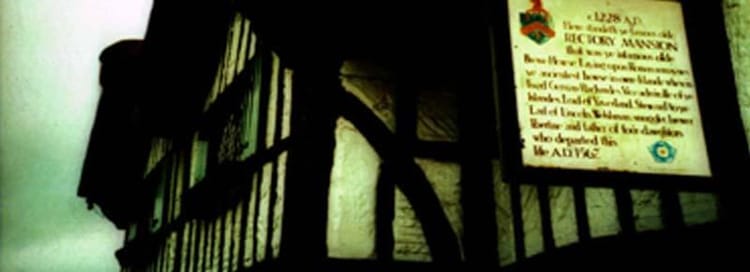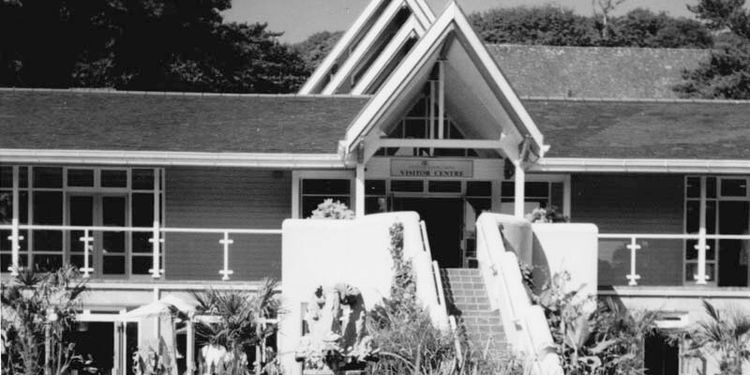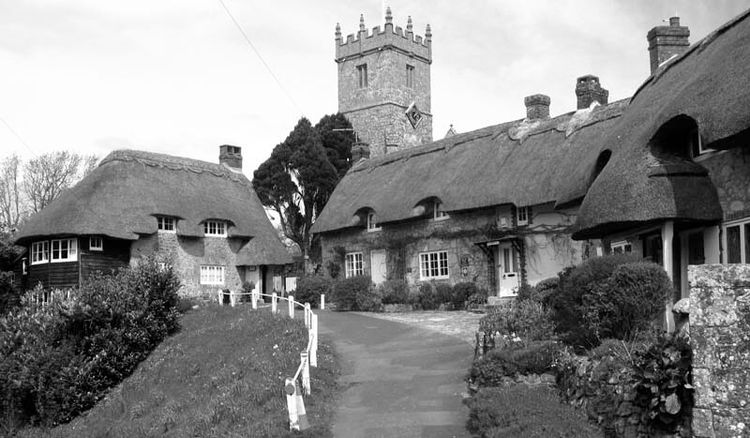Bonchurch Old Church. Ghosts of the Isle of Wight, with Margo Williams.
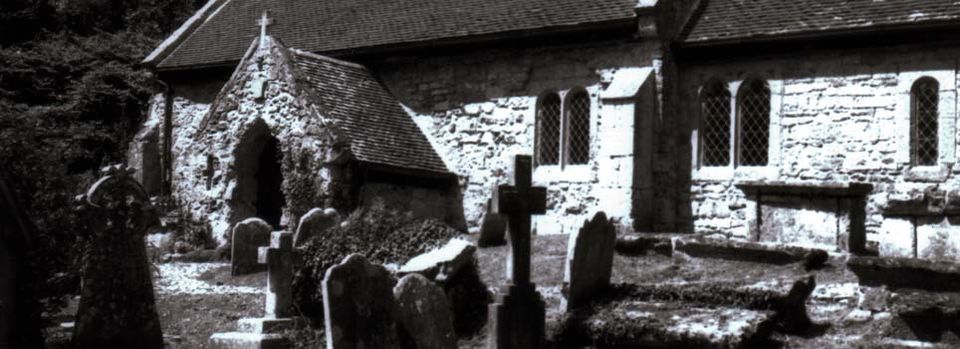
The Haunted Church
A PAIR OF GHOSTS haunted this old church; each a prisoner of the weird power of love. Ghost Hunter Margo Williams investigates.
The Old church of St. Boniface is a peaceful idyll during most of the year, far from busy roads; during winter months when graves and ground are a mass of fallen oak leaves and acorns, the roar of the sea is enough to wake the dead.
Though perhaps not enough to disturb the two ghosts resident in this church.
Local legend claims the church is named in honour of Boniface, the second of two saints to visit the Isle of Wight. In preparation for his mission work, during the early 700s, in the wilderness of continental Europe, Boniface ventured into this wild sea-swept region of the Undercliff.
According to legend he found a prominent rock from which he preached to the fisher-folk; however, not until many centuries later was this church founded to commemorate that occasion.
The building is among the world’s smallest houses of God at a mere sixteen metres long, by four wide.
The vast hillside above is now dedicated to this brave man’s memory, and Bonchurch residents of nature-friendly frame of mind note the happy, if strange, coincidence of the return of the oaks to Boniface Down.
For many years the hillside was bare, shorn smooth of forest, until someone not so long ago wandered up and down casting acorns as they walked and so the hill is forested. A few unhappy residents tried to shave it, but the trees have a hold now and the badgers and squirrels make a home.

St. Boniface the Doer of Good
Visitors to Bonchurch are told Boniface’s name meant ‘Doer of Good’ and that he is best remembered for his evangelical work in Germany.
In particular his actions in the village of Geismar, where the bishop announced his intention to remove their sacred tree, a great oak the people named Donnerreich, Oak of Thunder.
No one believed he would do such a thing, until next morning Boniface and his followers entered the village, insisting it was the Devil’s Tree.
Still the villagers thought he was bluffing, but to their astonishment the bishop and his friends raised axes and hacked at the tree. The villagers looked to the skies and flinched at such outrageous blasphemy, this defiance of the Gods.
Shocked silent, the entire village waited braced for the consequence. But the monk was not struck down de.d. No thunderbolt, no thunder, not even a fizzle.
Boniface smiled at the villagers, laid down axe and brushed chippings from his robe. ‘See?’ said he to the villagers who stared at the bishop and then up to the skies, watching for the thunderbolt that must surely strike him de.d.
Still nothing happened, and among the villagers there was puzzled murmuring, for their gods and goddesses had not prevented this man from destroying the sacred tree.
No sign of retribution, whatsoever. The monk was still alive and smiling widely, while his followers patted his back and chanted: ‘Doer of Good, Doer of Good!’
The villagers looked in astonished disbelief until Boniface explained that he lived because their gods and goddesses did not. Some stared at the broken tree teetering in the wind; and when what was left of it finally crashed to the ground, most decided he must be right.
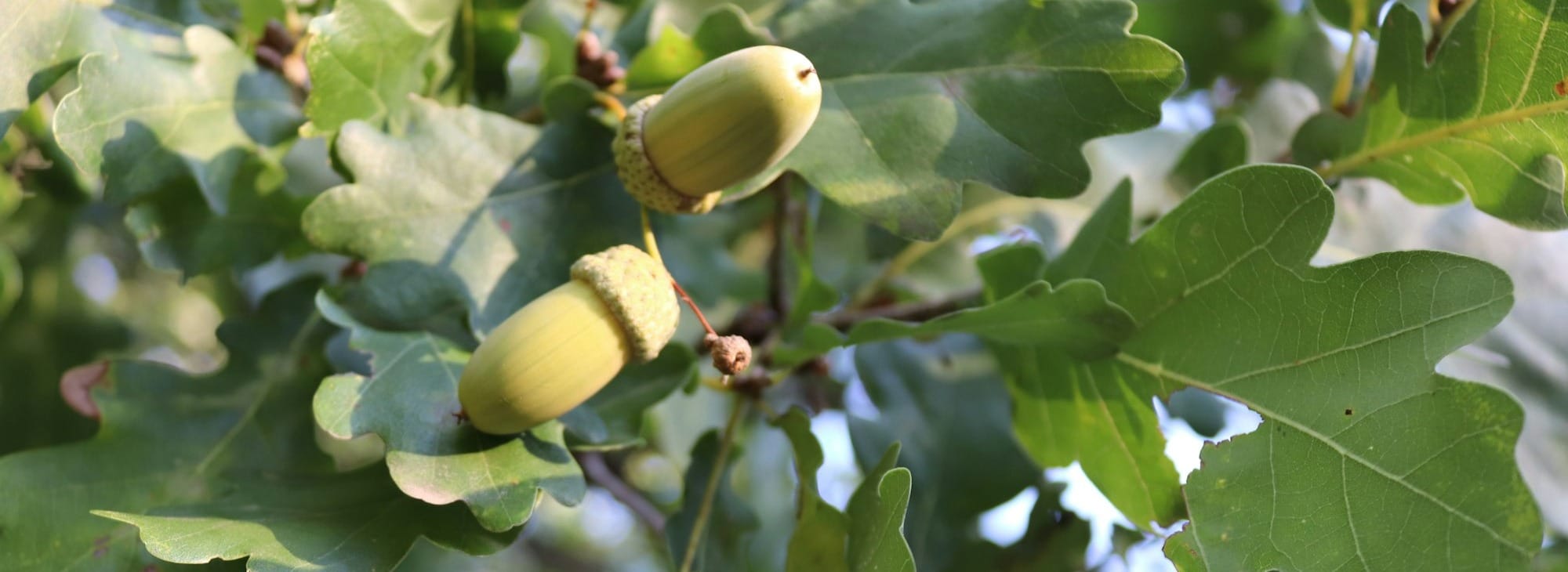
Boniface the Great
Boniface, from lowly Devonshire roots, grew tall and spread wide in influence and in continental ways. Great and powerful kings became his friends, and at the age of 63 he retired from the highest German office as Archbishop of Mainz.
Ever active of mind, he noticed his first converts slipping back into their old ways of nature worship and so resolved to reconvert them. He hired a boat and sailed the river Borne baptising and blessing as many as he could.
By the summer of AD 754 he reached Dokkum and planned a confirmation session at the riverside. During that sunny morning, while he sat ashore in his tent, his prayers were interrupted by noise of angry shouting and sound of horses.
Boniface stepped outside to confront the cause of the commotion, to find a group of well-armed bandits. After a few rudimentary questions he discovered the reason for their visit was not confirmation, they had something else in mind.
As Boniface stared at the heathen brutes, the heathen brutes sized the bishop’s height and selected a bl.de. And when the blow felled Boniface it was not a bolt of lightning and instant obliteration, but the hack, splurge and guggle of an unpleasant d.ath by chopping.
The Ghosts of Boniface Old Church
The people of Bonchurch still remember this brave martyr whose name adorns their surroundings; and the ghosts of his tiny church will tell you his suffering is long since over; as is, to some extent, theirs.
Percy was not the first ghostly groper I encountered; I have found many of his kind haunting pubs and bars. Being a ghost does have some advantages, as Percy since discovered; although it cannot offer the satisfaction of warm living flesh.
Heaven only knows what effect Percy has had upon the many living congregations during the years of his haunting; and upon the ghostly Annie, doomed to haunt beside him in this intimate little church.
Was this unexpected relationship heaven or hell, for either or both?
“...My name is Percy. You keep feeling me touch you,” he said.
Yes, I did as I sat in the church ready with sharpened pencil and blank paper to record his words.
“Could not keep me hands to meself even in church," he continued. "To touch a woman’s behind or bre.sts gave me much pleasure. Women gave me a miss if they could. Never married, never walked a girl out. All were scared of me, and with good reason.
Preacher told me off. Sat at the back of the church so he would not see. Have lingered here long enough. You can release me. I am sorry I kept touching you, could not help it. Thank you for sending me towards a light.”
Immediately after Percy finished, a female ghost followed with a sigh.
“...1734 I died. 1704 I was born in a tiny cottage by the sea and so near this church,’ she said. ‘That was the main thing in life. Sunday I came twice and on a Wednesday as well. I taught four children in a big house for five days a week. I was a plain girl, no frills or curls for me. I was ugly. No man spoke a sweet word to me.
I craved affection. God was my only comfort, and his son Jesus. I would sit in front of a painting of him in my room, staring for hours hoping he really loved me."
The ghost paused, I waited; pencil ready. Annie shared her last thoughts on love.
"To be starved of love is wicked for a woman. Then I di.d. I had not been perfect, but not very wicked. I found when I went through the tunnel I was not going to Jesus, as he had gone. And God? There were dozens of them. Where was my God I had come to this church to pray to? I turned round and came back.
Have been here ever since, being very spiteful to the visitors if I saw fit, playing nasty jokes on them. I see I can go on now after such a long time. My name is Annie. I do thank you for your help if it is you who is helping, or these lovely goddesses.”
Presumably Percy will not be displeased to find Heaven is populated by females though chances are he may have to curb his compulsion if he wants to remain.
It is possible Annie simply passed through the wrong ‘tunnel’, as she described it. Her congregation, and even those of today assume there is only one Heaven, and conversely Hell, but how can we be so sure there is not more than one?
‘Impossible!’ would have been Annie’s lifetime response. Surprisingly she might find support of sorts among Bonchurch’s 21st century scientists.
Hell and Heaven
If asked where is Heaven, many Isle of Wight residents point upward to the sky. Hell is in a downward destination, but on a spinning globe on which the masses of humankind inhabit two hemispheres, identifying the exact location of these two destinations becomes a problem.
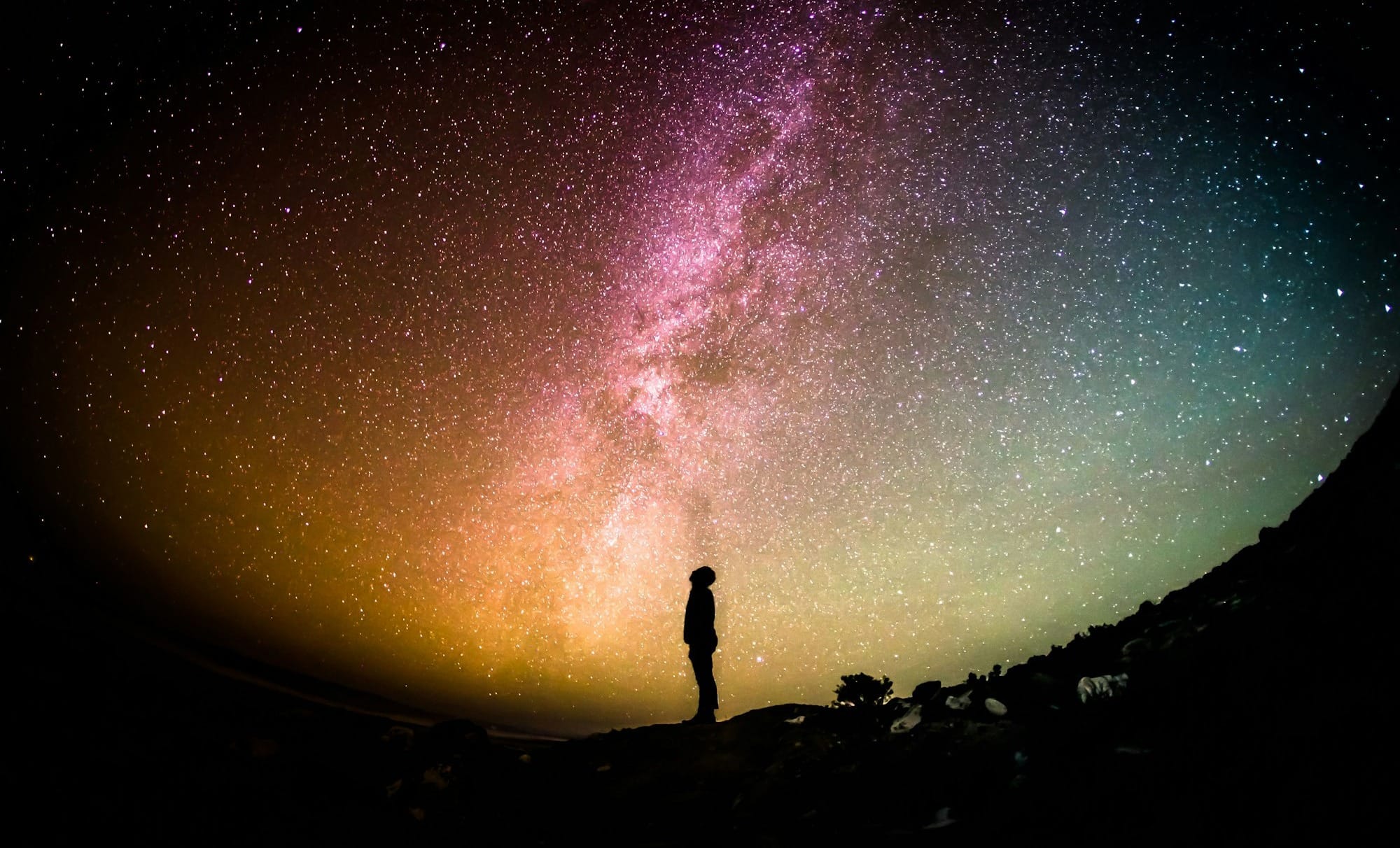
As science has advanced, Heaven has receded.
In the distant past, those who lived on the Bonchurch shoreline assumed Heaven to be where the sun set, out beyond Ventnor’s horizon.
Those surrounded by mountains assumed it perched on some high peak; and those on flat plains naturally assumed it was up in the starry sky. So, does Heaven exist?
Our most powerful telescopes gaze out on a vast ocean of stars and galaxies fading into the distance of countless light years. Generally we tend not to think of Heaven as another planet out there somewhere.
Since Annie died and became a ghost science challenged traditional Biblical accounts; challenges of which she would be unaware. For since de.th her view of the world of the living was restricted to what she could see through the tiny windows of this church.
And for her it would seem as if nothing has changed, for there are no new buildings to alter the rural idyll since the time of her life. Each year the acorns grow; each year oak leaves blow in through that opened door.
How could she know of Darwin and Einstein, or space exploration? But even if she did, for a moment’s concentration, yell “Percy desist! I am trying to listen to the living,” Annie would be lost for words.
More Things in Heaven and Earth
Science increasingly scoffed at her belief in after-death realms of paradise and punishment, insisting that is a self-soothing delusion. Sober science has until recently reminded us of the fact that all there is ‘out there’ is cold, lifeless space, with three predictable dimensions. A reality in which Percy has no place.
Ventnor’s Botanic Garden curator expressed to me the problem science shares with Bonchurch’s congregation: someone invisible is doing weird things.
Percy and others found nearby had small but evident influence on the living. I do not think it an ability peculiar to ghosts in the Undercliff.
Their abilities with physical objects, human and inanimate, is proof they are not fantasy. The curator and his deputy hold out hope science will discover a ‘Theory of Everything’ to account for that weirdness.
In support of this objective powerful telescopes and computing technology provide deeper vision into outer space. Annie’s beloved origin story was replaced by a Big Bang explosion and more recently Black Holes.
It is true to say we now know more, and also less about how things are.
The data generated is surprisingly supportive of Annie’s post-death position. Life, the universe and everything is itemised into percentages: only 4 % of everything is visible. 23 % undetectable, and 73 % is unimaginable. (Source Tim Radford)
Science accepts the terms ‘Dark Energy’ and ‘Dark Matter’, in place of ‘weird things happening’ and ‘the invisible’.
By way of explanation, some insist ours is one of an infinite number of space-time realities; a multiverse of alternative dimensions connected by wormhole portals. Annie probably agrees with that.
Our inner world is surprising too.
Our sub-atomic particle existence exposed to scrutiny; science has discovered that our living bodies may look solid, but that is an illusion which perishes after our average life span allotment of ‘three score years and ten’.
Annie remained self-aware since 1704. Percy perhaps not so long, but long enough to prove the dead are part of the Theory of Everything.
Moreover, Percy, Emma, Ted and Annie are more permanent than Bonchurch’s congregation and the Botanic garden’s staff.
We the living are the ghosts.
If, theoretically at least, there are other dimensions to existence, Annie now has help in her quest to find the God of her dreams.
Exploring the haunted Isle of Wight
Thank you for your company on this short tour of Isle of Wight mysteries and haunting. If you would like to know more about Margo Williams' investigations in Bonchurch and other matters of heaven and hell, read this book. Now available from Amazon.

